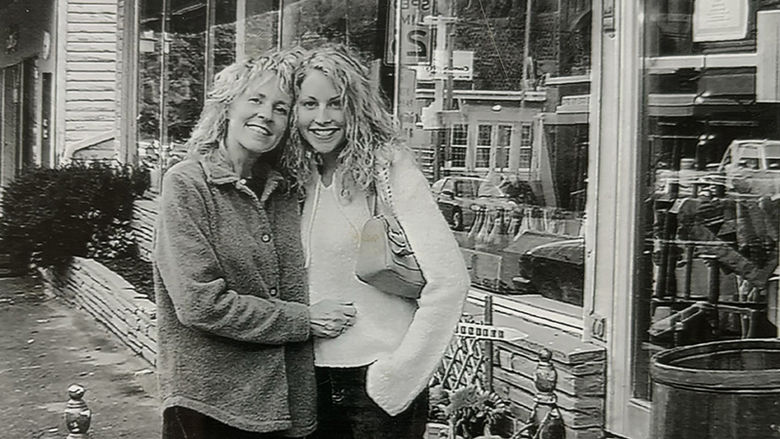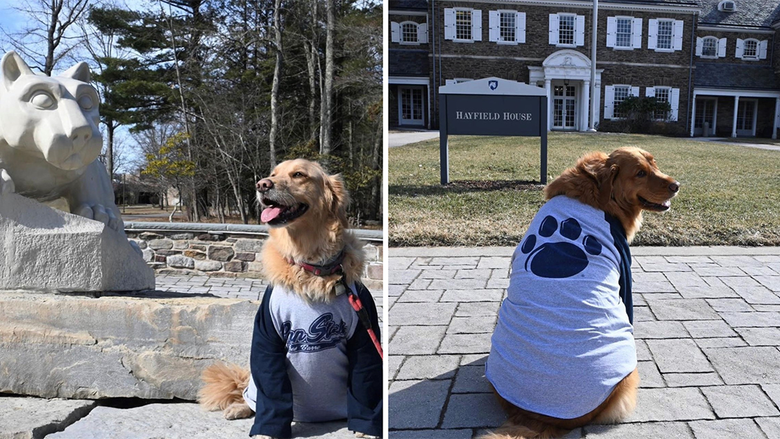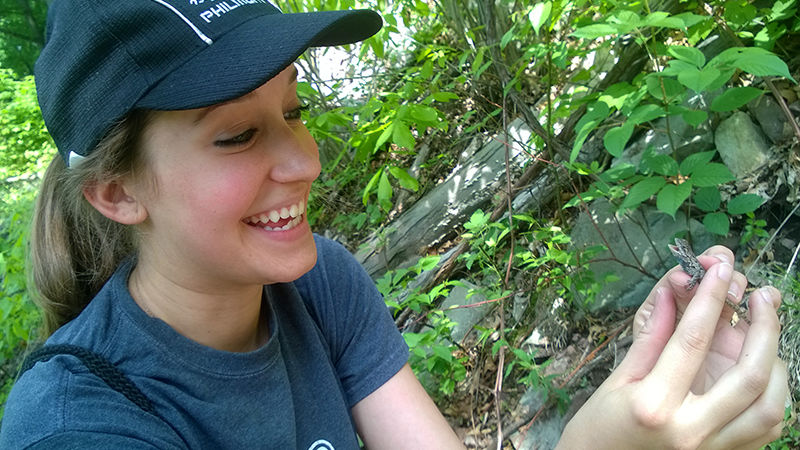

This dialog contains the full navigation menu for this site.

“It is always so exciting to see others capture their first Pennsylvania fence lizard, and my summer students are no exception! Bethany had made a few attempts with the handheld noose, or lasso, that we use to catch the lizards. The first field trip was difficult because of the wind blowing the noose unpredictably, and because of the precarious terrain,” describes Assistant Biology Professor, Renee Roiser. “The first few tries were unsuccessful. It had been a long day of hiking in the heat. We didn't see rattlesnakes that day, but there were copperheads to test our fortitude. We were checking one last spot before hiking back to the car when there it was - a small female lizard basking in the sun by a crevice in a limestone cliff face. I used my fishing pole to keep the lizard out of the crevice while Bethany expertly slipped the lasso over her head and gently lifted her from the rock. Bethany's smile was priceless! After a full field season, she nooses and handles lizards like a pro. I am incredibly proud of how far she has come and how dedicated she is to research!”
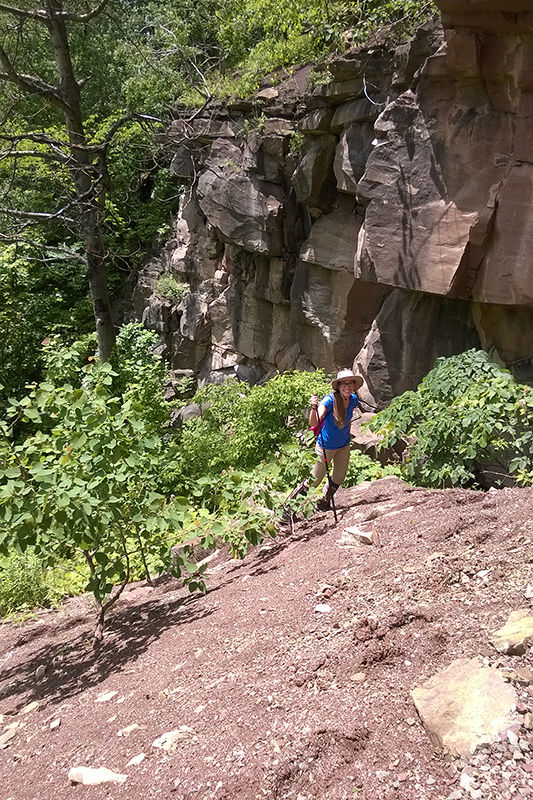
Bethany Dennis hiking through the fence lizard's natural habitat
“Successfully catching a lizard gave me such an adrenaline rush, only making me want to catch more and more,” explains student Bethany Dennis. “In working with Dr. Rosier, I learned so much about all the hard work that goes into field work and biology research. The time, effort, and attention that Dr. Rosier's research requires is motivating and inspiring.”
Going on her third year of teaching at Penn State Wilkes-Barre, Roiser’s research centers around the impact of early-life environments on behavioral development in animals.
“For humans, the earliest environment is in the mother's womb. Since eastern fence lizards reproduce by laying eggs, the nest and internal egg environments are just as important to lizards as the womb is to humans. Small changes in these early stages can have significant impacts on development and ultimately survival,” states Roiser. “This summer my students and I continued the projects that we started last year investigating the nest selection behavior of gravid (i.e., containing eggs) females in Pennsylvania. If you have ever visited Tennessee or Arkansas, you will know that the climate in Pennsylvania is a bit different from down south. Consequently, we may expect that lizards at this northern range limit may choose to lay their eggs in different places than females would in the south.”
In addition to studying nest selection, Roiser also spends time observing the visual interaction in behavioral development of hatchling fence lizards.
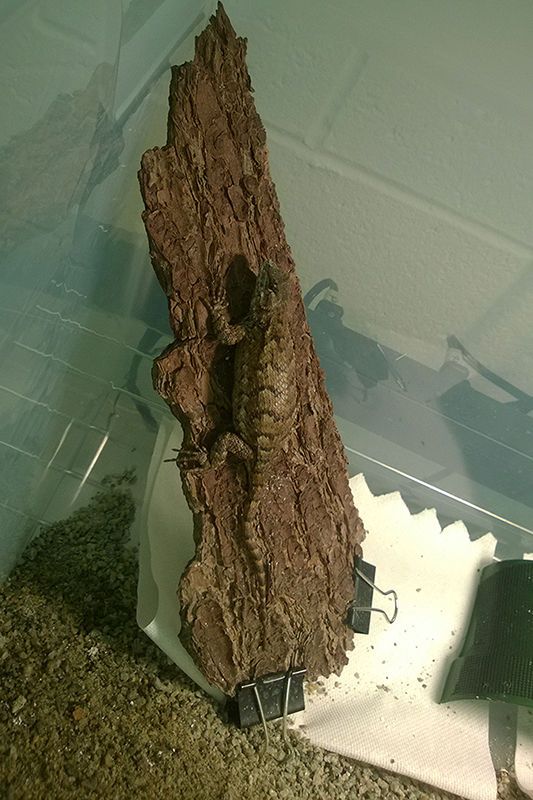
Lizzy the Pennsylvania fence lizard
“These lizards often communicate to one another with visual displays and also odor cues. Lizards and other herpetofauna are often housed alone in captivity because it is assumed that they are not social creatures; however, some of my previous research and that of other herpetologists is beginning to suggest that social interactions are necessary for these animals to develop behaviors that aid in survival, such as foraging and exploratory behaviors.”
“The social environments in which the baby lizards live are divided into three categories - groups (two lizards in a single enclosure, unable to see any other lizards except each other), individual (one lizard in a single enclosure, unable to see any other lizards), and isolated (two separate enclosures each containing a single lizard, positioned so that each lizard can see the other but not interact),” says Dennis. “With this, we measure the plasticity of their behavior in an effort to see if social impacts on exploratory behavior persist even after the lizards are removed from the social environment.”
Dennis is not the only student Roiser has roping lizards for research. Matthew Korea, an aspiring dentist, has been working with Roiser for three summers.
“He aspires to be a dentist, but I take him out to catch lizards. Surely lizard wrangling will help his dental school application,” laughs Roiser. “He caught his first lizard last summer, and it was quite dramatic! Once again, we had been hiking on an oppressively hot day and dodging rattlesnakes. We were about to leave when our contact for the field site convinced us to go back in for one more attempt. Once again we skirted around rattlesnakes (large ones that were rattling quite aggressively) and paused for a moment to regroup by a large tree. Suddenly, we spotted a large male fence lizard on the side of the tree overhead. Matt prepared his noose as he had been trained and slowly eased the delicate loop of fishing line toward the head of the lizard, who scampered further up the tree. We all held our breath as he tried again, and success! He deftly slipped the loop over the lizard's head peeled him from the tree. Now, after three years of lizard catching, Matt can catch lizards even in tricky places.”
Both Dennis and Korea have moved on to other Penn State campuses but Roiser is very positive about wherever their futures may take them.
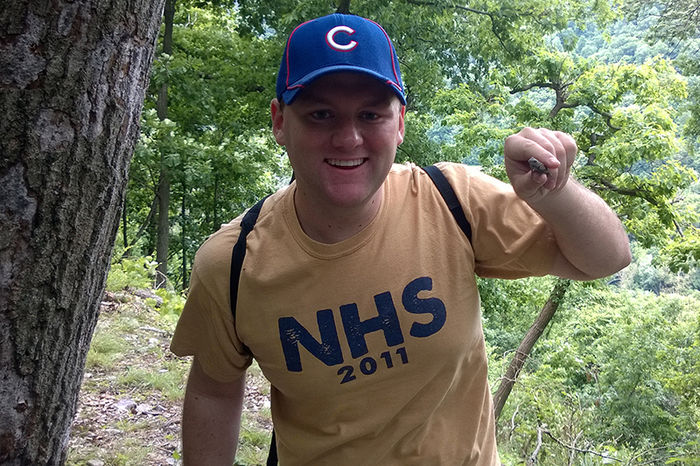
Matt Korea, aspiring dentist, capturing fence lizards
“Both Bethany and Matt have tales to tell of intense hikes, hair-raising encounters with wildlife (mostly bears and venomous snakes), and the euphoria of a lizard catch. Seeing them leave for their other campuses is bittersweet. I know they will both complete their degrees and do great things, and hopefully cherish these lizard adventure memories we have made.”
While Korea may have his heart set on dental school, Dennis’s future is a little less certain.
“At this point in my life, I'm not entirely sure of the specific career I aspire to have. All I know is I want it to involve nature and being outdoors,” describes Dennis. “My current major is declared as Ecology, a subset of Biology. I hope to someday use my knowledge from this degree to somehow improve and conserve the world and its wildlife.”
As for Roiser’s own first experience catching a lizard, she states honestly, she does not remember it.
